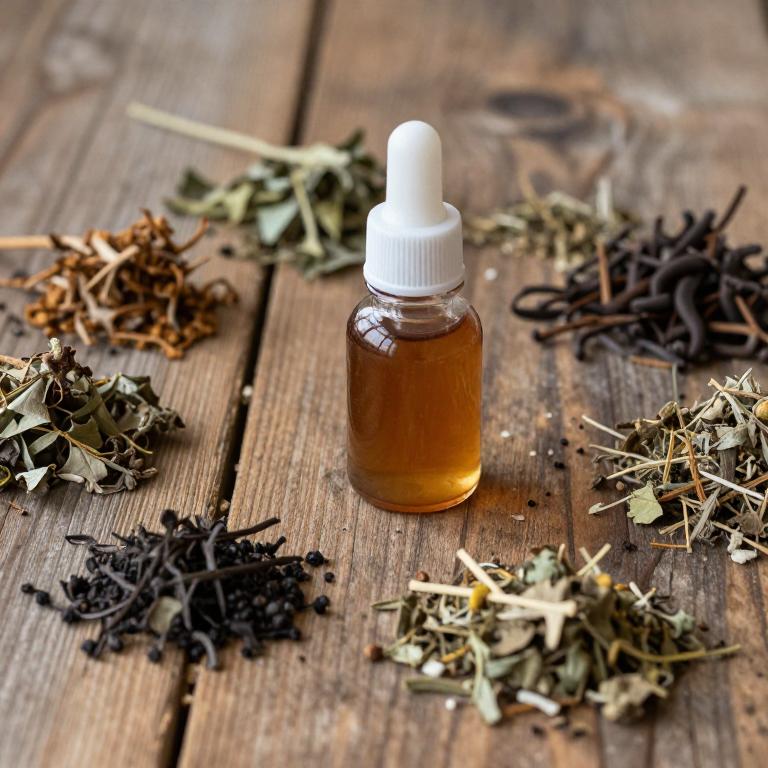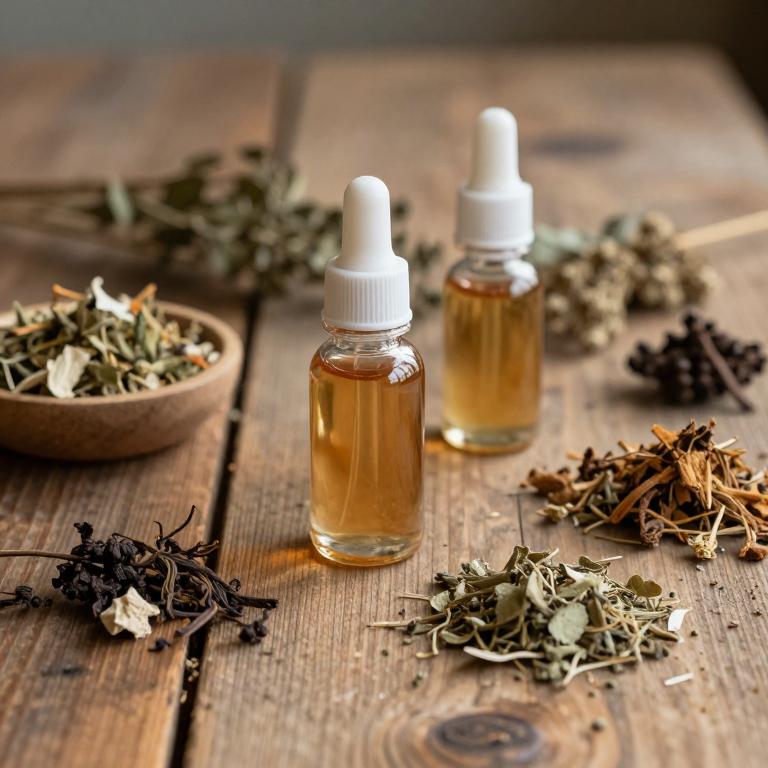10 Best Herbal Linctuses For Throat Pain

Herbal linctuses are traditional remedies designed to soothe throat pain and reduce coughing by combining natural ingredients with expectorants and soothing agents.
These formulations often include herbs such as licorice root, eucalyptus, and thyme, which are known for their anti-inflammatory and antimicrobial properties. They are typically used for mild to moderate throat irritation caused by colds, sore throats, or bronchitis, offering a gentler alternative to over-the-counter medications. Herbal linctuses can help lubricate the throat and ease discomfort, making them a popular choice for those seeking natural relief.
However, it is important to consult a healthcare provider before use, especially for children or individuals with known allergies or medical conditions.
Table of Contents
- 1. Ginger (Zingiber officinale)
- 2. Thyme (Thymus vulgaris)
- 3. Fennel (Foeniculum vulgare)
- 4. Chamomile (Matricaria chamomilla)
- 5. Salvia (Salvia officinalis)
- 6. Black elderberry (Sambucus nigra)
- 7. Eucalyptus (Eucalyptus globulus)
- 8. Peppermint (Mentha piperita)
- 9. Ceylon cinnamon (Cinnamomum zeylanicum)
- 10. Licorice (Glycyrrhiza glabra)
1. Ginger (Zingiber officinale)

Zingiber officinale, commonly known as ginger, has been traditionally used for its anti-inflammatory and analgesic properties, making it a popular ingredient in herbal linctuses for alleviating throat pain.
These linctuses often combine ginger extract with honey or other soothing agents to create a warm, comforting remedy that can help reduce irritation and inflammation in the throat. The active compounds in ginger, such as gingerol and shogaol, are believed to inhibit the production of pro-inflammatory cytokines, thereby easing discomfort. Herbal linctuses containing zingiber officinale are generally considered safe for most adults and can be used as a natural alternative to conventional throat lozenges.
However, individuals with allergies to ginger or those taking certain medications should consult a healthcare provider before use.
2. Thyme (Thymus vulgaris)

Thymus vulgaris, commonly known as thyme, is a popular herb used in the formulation of herbal linctuses to alleviate throat pain.
These linctuses are typically made by infusing thyme oil or extract into a base of honey or glycerin, creating a soothing and aromatic preparation. The active compounds in thyme, such as thymol and carvacrol, possess antimicrobial and anti-inflammatory properties that help reduce irritation and infection in the throat. Thymus vulgaris linctuses are often recommended for their ability to ease coughing and provide relief from soreness caused by colds or throat infections.
Due to their natural composition, these herbal remedies are considered safe for many individuals, though they should be used as part of a broader treatment plan under the guidance of a healthcare professional.
3. Fennel (Foeniculum vulgare)

Foeniculum vulgare, commonly known as fennel, is often used in herbal linctuses to alleviate throat pain due to its anti-inflammatory and antiseptic properties.
The essential oils in fennel, particularly anethol, help to soothe irritated mucous membranes and reduce inflammation in the throat. These herbal linctuses are typically prepared by combining fennel seeds or oil with honey or glycerin to create a soothing, aromatic preparation. They are particularly effective for treating sore throats caused by colds, coughs, or minor infections.
Fennel-based linctuses are considered safe for most adults and children, though they should be used with caution in individuals with allergies or specific medical conditions.
4. Chamomile (Matricaria chamomilla)

Matricaria chamomilla, commonly known as chamomile, is a herbal remedy often used in the form of linctus to soothe throat pain and inflammation.
The linctus contains the essential oils and active compounds from dried chamomile flowers, which have anti-inflammatory, antispasmodic, and mild analgesic properties. When used as a soothing gargle or syrup, it can help reduce irritation and discomfort in the throat, making it particularly effective for sore throats caused by colds or allergies. The calming effect of chamomile also contributes to easing coughing and promoting better sleep in individuals suffering from throat discomfort.
As a natural alternative to conventional treatments, chamomile linctus offers a gentle and safe option for those seeking relief from mild throat pain.
5. Salvia (Salvia officinalis)

Salvia officinalis, commonly known as sage, has been traditionally used in herbal linctuses to alleviate throat pain due to its antimicrobial and anti-inflammatory properties.
These linctuses typically contain a concentrated form of sage extract, which helps reduce irritation and soothe inflamed tissues in the throat. The essential oils in sage, such as thujone and camphor, contribute to its expectorant and decongestant effects, making it effective for coughs and sore throats. Sage linctuses are often preferred as a natural alternative to conventional throat lozenges, especially for individuals seeking remedies without synthetic additives.
However, it is important to consult a healthcare professional before use, particularly for those with specific allergies or medical conditions.
6. Black elderberry (Sambucus nigra)

Sambucus nigra, commonly known as the European elderberry, has been traditionally used in herbal medicine for its potential soothing properties.
Sambucus nigra herbal linctuses are formulated to provide relief from throat pain and irritation, often containing extracts of the elderberry fruit. These linctuses may help reduce inflammation and ease coughing by coating the throat and alleviating discomfort. They are typically used as a natural alternative to conventional throat lozenges or medications.
However, it is important to consult a healthcare professional before using these products, especially for children or individuals with underlying health conditions.
7. Eucalyptus (Eucalyptus globulus)

Eucalyptus globulus, commonly known as the Australian eucalyptus, is a key ingredient in many herbal linctuses used to alleviate throat pain.
These linctuses typically contain a combination of eucalyptus oil, honey, and other soothing agents that work together to reduce inflammation and soothe irritated tissues in the throat. The eucalyptus oil provides a cooling effect and has antimicrobial properties that help combat infections. When used regularly, these herbal linctuses can offer relief from symptoms such as soreness, hoarseness, and coughing.
They are often preferred as a natural alternative to conventional cough medicines, especially for those seeking remedies with fewer side effects.
8. Peppermint (Mentha piperita)

Mentha piperita, commonly known as peppermint, is a popular herbal ingredient used in linctuses to alleviate throat pain due to its soothing and antiseptic properties.
These herbal linctuses often contain menthol, which helps to reduce inflammation and numb the throat, providing temporary relief from discomfort. The cooling effect of peppermint can also help to ease coughing and make swallowing more comfortable. Peppermint linctuses are typically safe for most adults and may be used as a natural alternative to conventional throat lozenges.
However, they should be used with caution in children and individuals with certain medical conditions, as advised by a healthcare professional.
9. Ceylon cinnamon (Cinnamomum zeylanicum)

Cinnamomum zeylanicum, commonly known as cinnamon, has been traditionally used in herbal linctuses to alleviate throat pain due to its antimicrobial and anti-inflammatory properties.
These linctuses often contain cinnamon oil or powder, which can help reduce irritation and soothe sore throats by coating the mucous membranes. The aromatic compounds in cinnamon may also provide a pleasant taste and stimulate saliva production, further easing discomfort. When used as a natural remedy, cinnamon-based linctuses can offer relief without the side effects associated with some pharmaceutical treatments.
However, it is important to consult a healthcare professional before using these remedies, especially for prolonged or severe throat pain.
10. Licorice (Glycyrrhiza glabra)

Glycyrrhiza glabra, commonly known as licorice root, is a traditional herbal remedy widely used in linctuses to soothe throat pain and irritation.
The active compounds in licorice root, such as glycyrrhizin and flavonoids, possess anti-inflammatory, antiviral, and expectorant properties that help reduce swelling and ease coughing. When incorporated into linctuses, licorice root forms a protective layer over the throat lining, providing relief from soreness and discomfort. Its sweet taste also makes it more palatable for regular use, encouraging adherence to the treatment.
However, long-term use of licorice-based linctuses should be monitored due to potential side effects like hypertension and fluid retention.